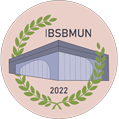In this article we have interviewed 6 of IBSBMUN’s key staff members, to find out what exactly they do and to see if they have any helpful tips for our future delegates.
First question, what is your experience with MUN’s?
Maria: I would say I have a large amount of MUN experience as I have been doing them since Year 7 (6th Grade). At this time I have done 13 conferences: 3 online, and 10 physically; with one being as a chair. Now of course, I get to be the Secretary General at an MUN, the pinnacle of any MUN career.
Melissa: I started MUN in year 9 as admin staff and instantly wanted to participate in the conferences myself. Ever since I have attended six conferences as a delegate.
Rares: I’ve taken a slightly different approach with regard to MUNs than most of my peers, focusing on quality rather than quantity. I started preparing in late 2017 and the first conference I attended was actually the Human Rights Council at CWMUN 2018 in New York City at the official UN Headquarters, getting an Honourable Mention. The year after, I attended CWMUN Rome at the UNFAO HQ, this time in the Security Council. Following those, I attended 2 more international events – CSMUN Greece 2020 and LSEMUN 2021, both online due to the pandemic – all the while doing mock simulations almost every week. This paid off; in the end, I walked out with some award from every single conference I attended. I’m now scheduled to attend 2 more international MUNs, namely CSMUN 2021 and LIMUN 2022.
Medeea: I have participated in one online MUN conference, LSEYouth MUN in February 2021
Ioana: Honestly I probably have the least experience in the team, I went to one conference in Year 7 and didn’t have the best of times. Since then Maria has converted me to the ways of MUN, by promising me a position in the organisational stuff rather than the technical side.
Vlad: I’ve attended 2 conferences so far. CSMUN in October 2020 and LSEMUN in February 2021.
Which of the MUN committees is your personal favourite, and why would you say that is?
Maria: This is a really difficult question to answer as I can already think of three possible responses. My ‘first love’ was ECOSOC, as I have done it twice and as it combines everything I like, the intertwine between economic and social issues. Another committee I like for the challenge is the Security Council, although I have only done it online thus far, I feel it attracts the type of delegates that are serious about MUNs and are great fun to deal with. A committee I have enjoyed in the past is the European Council (one of the reasons why it features on IBSBMUN’s expansive roster) and the twist it brings by having to represent certain figureheads rather than a whole nation, arguably making it easier due to you already having a political view to use. Although I can’t say for certain which committee is my favourite, it has to be one of these three.
Melissa: I would definitely say that my favourite committee so far has been the Security Council. I’m not sure why, but perhaps it’s because of the unique dynamics and debates it provides – I can’t imagine it ever getting boring.
Rares: Personally, I always loved the Security Council. I’m aware this answer may be cliché, but it’s cliché because it’s fun for a lot of people a lot of the time. Geopolitics and the interactions between countries on a politico-economic level has always been of great interest to me; a committee where I get to “steer the ship” just makes it all the more entertaining. Very rarely does the situation evolve to become boring, and the inevitable but often shifting factionalism within ensures even an otherwise insignificant state can be the kingmaker between two superpower blocs.
Medeea: I’ve only done SOCHUM currently, but I think the Security Council or International Criminal Court are by far the most interesting.
Ioana: If I were to attend IBSBMUN I’d like to join the Human Rights Committee. I’ve heard of other conferences having this type of committee, the types of issues it raises, and I have always been passionate about them. I like the idea of helping people that need our help. Especially considering how lucky we are to have what we have, the idea of the UN helping the less fortunate has always sat well with me.
Vlad: I would say that either DISEC, because it deals with matters of international security, or ECOSOC because the economy is vital to keep the world as we know it running.
What is your favourite part of the process of being in an MUN committee? (Creating resolutions, voting, debate, etc.)
Maria: Honestly I’d have to say the actual debate. Voting isn’t usually that exciting, unless someone ‘throws a curveball’; and the creation of resolutions is either calm or quite hectic. The debate is always really exciting and intense, making me feel powerful and allowing me to show my opinions and exercising my skills. Even the yelling and screaming is exhilarating in every sense of the word!
Melissa: Definitely the debate aspect of it. Especially in the type of format used by IBSBMUN, as it relies heavily on moderated caucuses as opposed to unmoderated ones. The moderated caucus gives delegates a chance to explore the other’s country policies and allows us to begin brainstorming ideas for resolutions.
Rares: In my early MUN days, I was a textbook power delegate. My personality and ability as a delegate revolved almost entirely around fiery speeches and divisive positions – representing Venezuela in 2018, I called the USA “heartless imperialists” in the heart of Manhattan! Since then, I’ve taken a much more balanced position; I’ve come to appreciate the behind-the-scenes dealmaking and intrigue especially, along with the lengthy process of drafting and redrafting endless clauses and resolutions to an almost lawyerish degree. However, I still love the vigorous head-to-head mud fights more than the bureaucracy; if by a lesser margin than before.
Medeea: Making allies and working on resolutions with those allies.
Ioana: As I said earlier, I don’t have too much experience. But when I went to an MUN my favourite part was meeting others and socializing. To see others’ points of view on the topics in situations both formal and informal was really interesting, the veteran MUN-ers were always really easy to talk to, being a kind of cross breed between the ‘cool kids’ and the ‘nerds’.
Vlad: Debating is my favourite part, as then you have the chance to put out your point as a delegate, to ask important questions, and to try and win over some undecided delegates to your delegations point of view.
What is your role when it comes to IBSBMUN, and what will that entail?
Maria: I am the Secretary General of IBSBMUN, meaning I’m in charge of everything. I oversee the roles of everyone else to ensure that things run smoothly, making sure that all the organisational issues are dealt with swiftly so IBSBMUN can be the best it can be. I also fill in all the gaps, fitting in for others if I am needed. Although other MUNs may split the Academics and Logistics, with the Conference Manager and Secretary General being in charge of each respectively, IBSBMUN has combined both aspects into the Secretary General’s role.
Melissa: I am Deputy Secretary General of Communications. Anything to do with communication I oversee. From ensuring the Instagram is at an exceptional standard to ensuring communication flows smoothly within the team!
Rares: At IBSBMUN, I have the honour of being Deputy Secretary-General of Programme. In effect, this means that much of the behind-the-scenes paperwork and administrative details are my job; the Rules of Procedure, for instance, were drafted by me personally almost entirely. Together with the other members of the Secretariat, we also coordinate the other teams within IBSBMUN, select committee topics, and prepare all of the extras at the conference – awards, parties, and all other things are discussed at length between the three of us.
Medeea: I am chief of marketing, so I work on everything that is available to the public audience: the website, the social media, and the designs. I also help with content creation.
Ioana: I am the Chief of Operations and Logistics. Before the conference we don’t have much to do, but once it starts it truly begins. We’re the glue that holds the event together, coming in at the last minute to sort out the rooms, accommodation, food, gift baskets and even the chairs. It’s all the stuff that comes after we know exactly who’s coming, so currently we’re focused on marketing, but I do look forward to when we have to run in and sort stuff out right before the event begins.
Vlad: I am part of the logistics team. This means that I will be helping to organise the logistical elements such as snacks, wifi connections and a host of other vital components which will help the conference run.
And finally, any tips or tricks for newcomers attending IBSBMUN?
Maria: This is going to be a long one. Firstly, just take the step and do it. You’ve signed up, and are likely to not fully understand everything for the first half of the conference, and that’s OK, treat this as a learning experience. You may be scared but embrace it, we can all learn from each other.
Secondly, although it may sound cliche, do your research. By research I don’t mean just reading the study guide and looking up Switzerland’s capital, I mean looking in depth into your topic and your nation’s stance, and more importantly other countries’ stances. This will make your life so much easier, especially if you’re a newcomer and scared enough already, as you won’t be confused on who to ally with and what words are being thrown around.
Just throw yourself into it as well, even veterans will make mistakes. Even if it’s scary, every single speech, resolution and discussion will provide skills for later situations. Everyone can and will make mistakes, people will have said things ten times worse than anything you can come up with, so just give it your all.
If all goes well and you enjoy yourself, you’ll be hooked, trust me it’s like a drug, just go enjoy yourself, and work on improving for the second, third and fourth conferences, because once you start you can’t stop.
Melissa: Prepare for committee sessions, but don’t stress too much, as long as you know your country’s policy you’ll do well. And don’t forget that MUN is a social event just as much as it is a diplomatic one so I encourage you to interact with people and make new friends because the MUN community is extremely welcoming!
Rares: Be brave! The simplest and most effective way to make yourself stand out, especially if you don’t have years of MUN experience or a natural talent for subtle diplomacy, is to shove yourself into every discussion and topic that you physically can. As I mentioned before, I walked out with an Honourable Mention from my first-ever MUN with hundreds if not thousands of delegates; I didn’t get it by sitting back and doing nothing. I got it by calling the USA a terrorist state to their face in their own backyard. Of course, bold statements must be backed up with equally powerful negotiating ability; and that is one skill that can only be developed with diligent work. In short, have a flaming heart and keep a cool head, and with a little practice, you’ll be representing Nicaragua in the South China Sea dispute and still be the one calling the shots.
Medeea: When preparing, don’t forget to research the foreign policies of other countries as well, not just your own, as it can help you understand the bigger picture, who to ally with and to know potential opposition. Also, make sure to know the Rules of Procedure and the way the sessions unfold well, so you aren’t confused during the conference. Lastly, don’t stress out and have fun during the conference: try to speak as much as you can without fearing you will mess up.
Ioana: With my ‘deep and vast experience’, all I can say is just enjoy it. When I tried it I was confused and stressed, but all of our staff can help with that, all of the delegates are really cool people and they can help out too! Don’t be there to compete for the awards, and to lead the pack; just chill out, socialise, have a blast and learn! EVeryone else on the team always says, ‘Once you’ve done one conference, you’ll get hooked’, so just try to have fun and focus more on the competitive nature in the future conferences you’ll ‘undoubtedly be doing’.
Vlad: I would say don’t be afraid. It’s an amazing experience and it can help you with your career later on. It might look daunting at first, but it is not that difficult once you get to know how a conference works. A few other tips I would give are: don’t be afraid to ask other delegates questions about their perspective, get your point across clearly and enjoy yourself.


